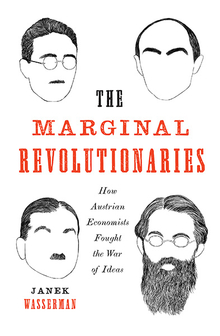The 2020 Joseph J. Spengler Best Book Prize is awarded to The Marginal Revolutionaries: How Austrian Economists Fought the War of Ideas, by Janek Wasserman by the committee of Paul Dudenhefer, Manuela Mosca, and Verena Halsmayer.

The Austrian school has “transformed our world,” Wasserman claims, and his book successfully supports his contention by providing a lively account of this enigmatic community of economists. Wasserman traces the origins, evolution, and, above all, the social activities and thought style of this multigenerational group from the Austro-Hungarian Empire to the United States, where most present-day members of the school can be found.
More than focusing on the ideas of the Austrians, Wasserman concentrates on the activities of the group—their seminars, their policy involvement, their institution building. He conveys the tremendous and tenacious goings-on of three generations of economists (and counting) who felt connected to each other through their haut bourgeois Austrian roots and who at every turn sought a vigorous engagement with the world as that world went through imperial dissolution, two world wars, and a global economic depression, along with the establishment, and eventual dissolution, of socialist states.
Wasserman’s account follows the lives and careers of around a dozen men, from Menger to Machlup and Morgenstern. But in Wasserman’s telling, the biggest star is not any particular individual but rather a city, or perhaps better yet a milieu: coffeehouse, fin-de-siècle, and Red Vienna. What became Austrian economics was made possible by the extraordinary intellectual and social life of the capital city between the mid-nineteenth century and the 1930s, taking place in coffeehouses and salons and organized in avant-garde circles (“Kreise”). It was the spirit and ethos of Vienna, with its emphasis on community and conversation, that gave the Austrian school its initial energy and sustained it over the next hundred years, surviving not only the collapse of the Empire but wars, emigration, and exile. As Wasserman states, “The Austrian School was a social network first and last.”
In providing the first history of the Austrians as a movement, Janek brings his account from central European elites to the 1980s Washington Consensus up to the present day–including the troubling use of the neo-Austrians. The Spengler committee is very pleased to award the best book prize to Janek Wasserman. […]